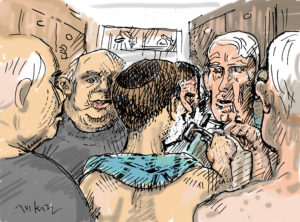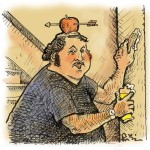Haim Watzman

“America is lucky,” he says as he smooths his hair and slaps his cheeks lightly. “To have Trump, I mean.”
But maybe I’m wrong. Bashan’s reverse image moves into my field of view just as I offer a weak smile and start on the stubble on the left side of my face.
“Right.” Bashan grimaces at his reflection. Where Lerner is steely, he is malleable; where Lerner has angles, he has arcs. A lot less hair, too, on his head, that is. Still, he must have been a looker back in the 1948 war, when they conquered the Negev together. Bashan had been a platoon commander in the Palmach’s Yiftah Brigade and Lerner one of his soldiers. I’d heard about it time and again in the shower.
“In our day,” Lerner’s reflection says as it adjusts the shoulders of its backward t-shirt, “the world had strong leaders who stood up for their countries. Churchill. De Gaulle. Roosevelt. Ben-Gurion.”
Bashan’s reflection leans forward at me and wiped a grain from its eye. “The Old Man.”
“Yeah, the Old Man,” Lerner says, his reflection eyeing his friend’s.
“Those were the days.” Bashan says, wiping his nose with a white handkerchief. “I remember him calling up the news broadcast on the Voice of Israel when it was on the air and telling the announcer to be more positive.”
I peer at his reflection, and then at that of my left cheek to see if I’ve missed any bristles.
“Ben-Gurion was a leader.” Lerner adjusts the belt on his jeans to get it just right. “He founded a country and an army and knew where he wanted to take us. He did a helluva job because he didn’t worry about what people around him said. He just went ahead and did it, even though the politicians put sticks in his wheels. Without them he would have done even more, but they wouldn’t let him.”
“How’s the wife?” Bashan asks as his reflection settles onto the yellow bench that runs between two rows of looking-glass lockers.
“The wife? Dahlia? What’s she got to do with it?” Lerner shoots back.
“Is it Dahlia now?” Bashan seems confused. “What happened to Bracha?”
“Bracha was years ago.”
“Ah.” Bashan leans forward and grips the looking-glass bench with his hands. “Before Hadas or after? Or maybe it was Ditza?”
“Not important. It’s Dahlia now.”
“Ok, Dahlia. Listen, I want to tell you a story I’ve never told you before.”
Lerner’s reflection looks down on Bashan’s reflection as I position the electric shaver over my reflection’s right cheek and get to work. “There is no story you haven’t told me,” he says slapping his friend on the shoulder. “Many times.” I would have nodded vigorously, but it wouldn’t have been good for my complexion.
“About my talk with Ben-Gurion. Did I ever tell you about that?”
Lerner’s image puts his hands on his hips. “You and the Old Man? You had coffee with the Old Man and never told me?”
Bashan shrugs. “It’s kind of embarrassing. Ruthie always forbade me to talk about it.” He falls silent, then puts a finger to the corner of his eye and sighs. “But I guess I can tell it now.”
“Do that.”
“So you remember how I met Ruthie, in Yeruham.”
“Sure, you heeded the call of Zionism and went with a bunch of other discharged officers to work with a bunch of Romanian refugees who’d been sent to live in the desert. You didn’t last long.”
“Nearly two years,” Bashan says, his reflection eyeing his friend’s. “You were studying accounting and chasing girls.”
“I didn’t need to chase anyone. They came to me!” Lerner’s face is bright and I don’t think it has to do with accounting.
“Well, it was a mess,” Bashan said. “Yeruham, I mean. No paved road to the town—did I say town? Camp. Sweltering sun by day, freezing at night. No electricity except for a couple small generators. No money, barely any decent food. The refugees felt as if their country had thrown them to the wolves. We felt pretty much the same. Ruthie tried to teach them Hebrew, but there were no books, barely chalk for the blackboards. I tried to teach them how to plant kitchen gardens, but there was barely enough water to drink. We tried to give them ideals, about the Jewish state, about pride in manual labor, but all that was far from their minds. There were a couple government officials there, from the Absorption Ministry, I think. Ahrele and Rosen. We assumed they were political appointments. We came up with ideas. One of the Romanians, an older guy, had charisma. He had a short beard, would sit on the stoop of his hut and others would gather around and listen to him, he’d speak for hours, we had no idea what he was saying, but he looked like an Ahad Ha’am of sorts, someone with a real vision. We didn’t know any Romanian. We had this idea that we’d ask the Romanian-language newspaper to send a reporter to write a story and that way we’d give this guy some credit and learn more about what he was saying and how we could work together. But Ahrele and Rosen said no way, that the guy was a ringleader, telling them not to send their kids to kibbutzim. Rosen screamed at us for half an hour. We were totally frustrated.”
The eyes of Lerner’s reflection catches my gaze. I finish my shave and don’t have any more excuses to stand there listening to them. Bashan’s reflection pats the bench next to him, inviting me to sit down. My reflection silently accepts.
“So I wrote a letter to the Old Man. I said this could not go on, the country was going down the drain because of the filth in the bureaucracy and the self-interest of government officials. I told him that we volunteers, all former officers, had sat down and decided that we had to take direct action. We put together a plan. We’d march on Jerusalem, call on our comrades, take over the radio, speak directly to the people, besiege the Knesset, send the politicians home. Of course we understood, I wrote to the Old Man, that he could never agree with us publicly, that would ruin him, but we understood. We’d send him to Sde Boker, to his kibbutz, for a rest. We’d need a few months, I wrote, but once we’d cleaned things up and the people saw they could do without a parliament for a few years, we’d call him back to Jerusalem and he could do his job without interference and put the country on the right track. Strong leadership, we said, is what the country needs. Democracy, tolerance, compromise—those are luxuries that maybe Israel can afford some years down the line, but not now with enemies surrounding us and a million immigrants to absorb.”
Bashan falls silent.
Lerner waits, then kicks the bench, as if trying to wake Bashan up. “And?”
“Are you sure it’s not Bracha? I thought Dalia was on the side.”
“We were talking about the Old Man.”
“Oh, right,” said Bashan. He taps me on the knee. “Can you help me get up?” he asks. His grip on my wrist is tight and he pulls me toward the mirror. “That’s Lerner,” he says, pointing to Lerner’s reflection. “He was one of my men in the war. A fierce fighter. Still is.”
Lerner’s reflection, behind us, rises on the balls of its feet and looks down at us. “The Old Man.”
“Right. So maybe a week after I sent the letter, on a Saturday morning, I’m working with some of the Romanians in a little vegetable garden we set up between two huts, it’s maybe nine in the morning, just starting to get hot. Ahrele and Rosen both come at a run. They’re out of breath and totally flustered. They say there’s a jeep that’s just arrived and that the driver has a letter and he’s taking me to Tel Aviv to see Ben-Gurion. Put on a white shirt, they order me. I run to tell Ruthie and she’s ready to faint, thinks I’ll get arrested, but off I go. And I get to Tel Aviv, and they take me to this little room in Sarona, in the Defense Ministry, and there’s the Old Man in his usual khaki shirt and shorts. He sends out his aid and tells me to sit down and he smiles at me and holds out my letter and says … Isn’t Bracha the one who had the incredibly long eyelashes?”
Lerner by now is looking grim. “The Old Man.”
“Right. So he says, ‘No. Absolutely not. I believe in democracy, despite all its problems. Your job is not to solve the country’s problems, it’s to do what good you can in the Negev. If you start down this road, you’ll become filthier than Ahrele and Rosen could ever be.’ Then he gets up, calls the driver in, and tells him to take me back to Yeruham.”
Bashan’s reflection put its arm around my back and gave me a squeeze as Lerner’s reflection looked on.
“A strong leader,” he says, and I’m not sure if it’s to my reflection or Lerner’s, “sees fifty years ahead.”
“But Trump,” says Lerner, about to launch into a speech. “Did you hear him condemn the terrorist attack?”
Bashan doesn’t answer right away. “Just words,” says Bashan. “Maybe they make you feel good, but that’s not what counts.”
Then he turns around. “Lerner,” he says, “Stop looking at the mirror and look at me.”
Lerner turns his gaze to his friend, but only after a last inventory of his reflection.
“Before she died,” Bashan tells his friend, “Ruthie told me that you paid her a visit while I went to chat with Ben-Gurion.”
Lerner stiffens. “So what if I did?”
Bashan looks at me. “Screw Trump,” he says.
Lerner’s reflection is about to say something but closes its mouth.
“Lerner,” Bashan says, “You’re dismissed.” It’s the softest but firmest order I’ve ever heard given.
I look past myself in the mirror. Lerner’s reflection is gone.
^^^^^^^^^^^^^^^^^^^^^^^^^^^^^^^^^^^^^^^
 Read more Necessary Stories!
Read more Necessary Stories!
Receive email alerts of new Necessary Stories every month, and other pieces by Haim:






Excellent story, Haim! Loved the interaction between Lerner and Bashan and the passage with the imagined Ben-Gurion as well as the lesson on the nature of leadership. Kol hakavod.
Excellent! You are a marvellous writer.